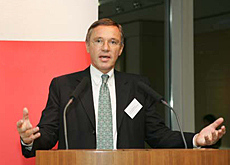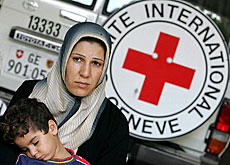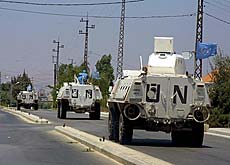“Lebanon is experiencing a real tragedy”

The Swiss ambassador to Lebanon, François Barras, has warned the conflict between Israel and Hezbollah is doing more than destroying the country's infrastructure.
Barras told swissinfo that the fighting was also harming the population and wrecking a nation that had finally become a symbol of religious co-existence for the region.
swissinfo: The last few Swiss wanting to get out of Lebanon left a few days ago. How well did the evacuations of nationals go?
François Barras: I wouldn’t say that we carried out evacuations, but that we repatriated Swiss who wanted to leave. There are still many of our citizens here. We even celebrated National Day on August 1, with 120 Swiss guests.
swissinfo: What have been the main problems you have faced and how did you solve them?
F.B.: We received a lot of phone calls. We also had to get in touch all the Swiss who were registered with us. So we had to set up a system with volunteers to handle the work. It didn’t come off too badly.
But keeping in touch with our nationals, especially in southern Lebanon, was difficult. Some of them were even cut off from the rest of the world for a while.
swissinfo: Now that those who wanted to leave are gone, what is your main priority as the Swiss ambassador in Beirut?
F.B.: We are now in the second phase of our work, humanitarian aid. A team of Swiss doctors, water specialists and logistics experts have been on the ground for ten days now collaborating with the Lebanese authorities.
Our people have managed to set up a camp for displaced persons, of which there are an estimated 700,000 to one million throughout the country. The south has been emptied of its inhabitants.
Our action sends a message that we are not abandoning Lebanon, that we are standing by its people in a difficult time.
swissinfo: How is Switzerland is positioning itself politically and diplomatically?
F.B.: We have a particular role as the depositary of the Geneva Conventions. Switzerland’s role is to denounce any violations. It has nothing to do with Swiss neutrality: we are just defending a principle.
We are fortunate to have contacts with both parties involved in the conflict and we have told them we are at their disposal.
swissinfo: What is your evaluation of the situation on the spot?
F.B.: For the first two weeks of the conflict, we didn’t have time to think. We had to get people home and that kept us busy day and night. We are now starting to realise that Lebanon is experiencing a real tragedy.
Just three weeks ago, it was summer and a time of festivals. I have great compassion for the Lebanese who have seen their efforts to rebuild their country destroyed again after 20 years of civil war and the assassination of [prime minister] Rafic Hariri.
Infrastructure has been destroyed. It’s like a curse in a country with positive values. It’s a nation that bears a message in this part of the world. There are 18 communities that manage to co-exist, it’s a democracy, a country that wanted to get up off the floor and that has been dealt a fatal blow.
swissinfo: How difficult is life for the Lebanese, when dealing with problems such as security, access to clean water, electricity, food and medication?
F.B.: The situation depends on where you live. In Beirut, stores still have supplies, but there are long queues at petrol stations because there is a fear fuel will be in short supply in the future, Lebanon is cut off from the world by an air and sea blockade, and even the main access roads have been attacked.
swissinfo: You arrived in Lebanon in March. Were you expecting this?
F.B.: No, not really. I know the Middle East fairly well. I understood the tensions and the dangers. But I had arrived in a country that was rebuilding itself and that was trying to make communities live together in a region were extremism is deeply rooted.
swissinfo-interview: Mathias Froidevaux
Since the beginning of fighting between Israeli forces and the Hezbollah militia on July 13, Switzerland has given the Swiss-run International Committee of the Red Cross SFr5.2 million ($4.3 million) for relief work in Lebanon.
Switzerland has also sent 800 kilograms of medication and seven tons of supplies, along with a dozen humanitarian specialists.
920 Swiss have been evacuated from Lebanon, including 15 people in a final operation on Wednesday.
On Friday, Israeli jets destroyed four bridges on the main coastal road between Beirut and northern Lebanon, a vital link to Syria.
François Barras was born in canton Valais. He has a law degree from Geneva University and holds a doctorate in anthropology from London University.
He joined the Swiss foreign ministry in 1986.
Previous positions include cultural attaché in Washington, ambassador to the United Arab Emirates and consul general for Hong Kong and Macao.
He has been the Swiss ambassador to Lebanon since March 2006.

In compliance with the JTI standards
More: SWI swissinfo.ch certified by the Journalism Trust Initiative



You can find an overview of ongoing debates with our journalists here. Please join us!
If you want to start a conversation about a topic raised in this article or want to report factual errors, email us at english@swissinfo.ch.